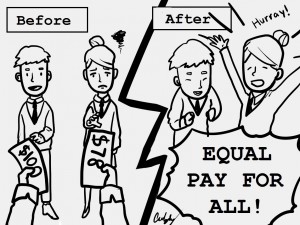Governor Brown Wages to Support Women at Work

MOOR editorial cartoon by Corly Huang
JENNIFER FAN
Staff Writer
Since the colonial days, America has been a patriarchal society. The majority of women were not able to participate in our democracy and vote until 1920 with the implementation of the 19th Amendment. Even so, a large percentage of women would remain in the domestic sphere for nearly another 50 years. Now in 2015, women make up nearly half of the workforce, yet make only 78 cents for every dollar a man receives for the same job, according to the U.S. Department of Labor.
On Oct. 8, Gov. Brown approved and signed the California Fair Pay Act, which would allow employees to file complaints over unfair wages and prevent them from being fired while discussing them. It also prevents employers from paying a man or woman less than their counterpart due to the work not being exactly alike.
The California Fair Pay Act will significantly contribute to women’s rights, adressing the failures of the Equal Pay Act of 1963, which states that women could not be paid less than men if they are “under similar working conditions.” The Equal Pay Act failed to address many women workers’ plights for equal wages because courts applied it only to work that was exactly the same. Under the new act, women are to be paid equally as their male counterparts if their work is substantially similar and requires the same amount of skill and effort. For example, a woman working as a housekeeper in a hotel can challenge her employer to provide the same wages as a male janitor who cleans the lobby.
The act will be a huge step for women’s rights, allowing women to step up and demand their own wages. However, there is still more steps to be taken for full workplace eqaulity. According to Business Insider, women in office jobs are often assigned to “office housework,” low-value tasks such as monotonous paperwork or distributing coffee.
Plain discrimination and the role of motherhood significantly contribute to the gender wage gap. According to The Atlantic, women who performed symphonies behind screens during auditions had much higher chances of advancement compared to women playing in the open. Additionally, many large corporations do not advance women to high positions because employers believe that they will eventually take maternity leave. The bill will certainly not end sexism and guarantee workplace equality, but it will surely be a huge step for feminism.
In a time when more women than ever are entering the workforce in all fields, including science, engineering and medicine, the California Fair Pay Act will be essential in ensuring that these women will be paid the wages they rightfully deserve. The next generation of women will no longer fear receiving lower wages because they will be given the opportunity to challenge them and demand the same pay as their male counterparts. Gov. Brown’s support and signing of the act has significantly contributed to a future when all people, despite their gender, will be truly equal.